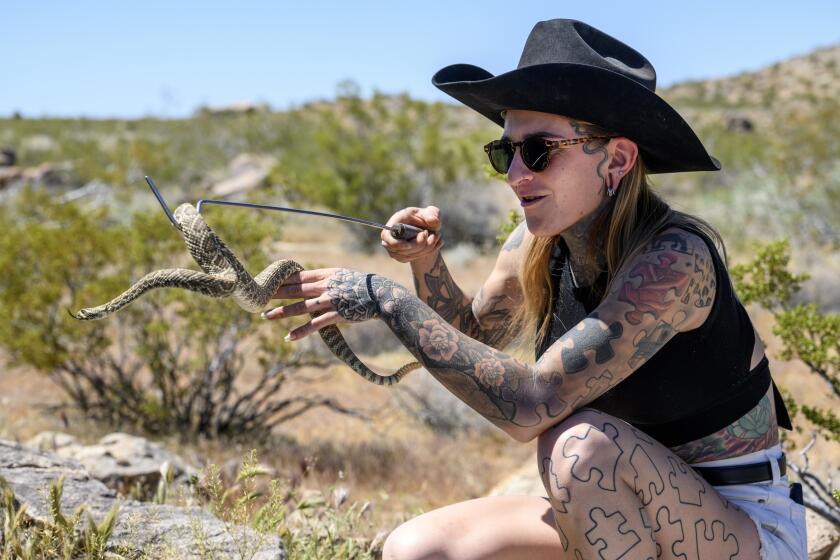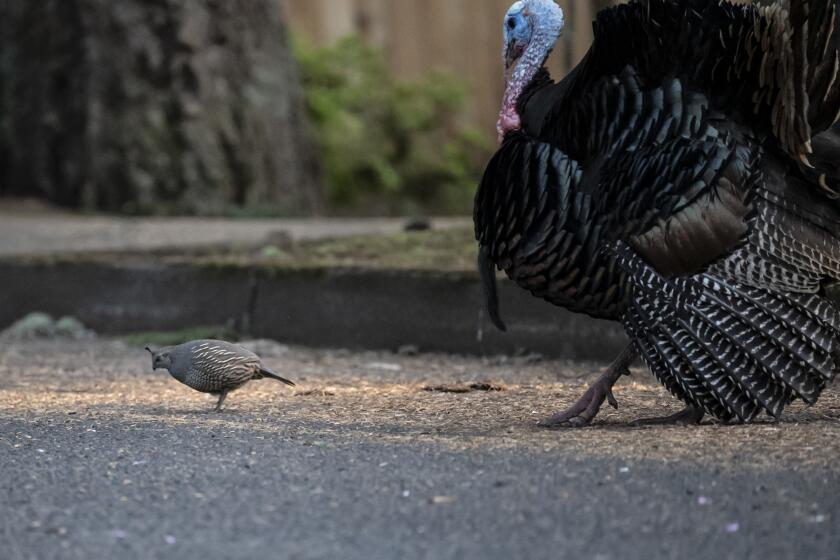Get the Scoop on the No. 2 Business
Joseph Brito stepped into his calling at a friend’s barbecue last summer, after a toddler in a pink dress stepped in something else. Inspiration struck at the sight of dog droppings clinging to the little girl’s polished shoes.
While the other adults blanched, Brito realized that he possessed the right stomach for tackling one of dog owners’ most dreaded chores.
“A light went on,” recalled Brito, 32, an apartment manager. “I said to my friend, “Would you pay someone to pick it up?”
Six months later, Brito and his wife, Isabel, founded the Poo Nanny Pet Waste Removal Service in Sherman Oaks, one of the latest entries in an expanding industry that indulges the hurried and harried. The job stinks, Brito concedes, but business is picking up.
According to the authoritative dog waste Web site run by Matthew Osborn of Columbus, Ohio, Poo Nanny is one of 340 businesses removing canine deposits, up from four in 1988, when Osborn began tracking the trade.
The potential for growth can be seen by deduction: More than 40 million dogs inhabit American homes and backyards, consuming more than 6 billion pounds of food annually.
Likely customers are those who consider themselves too busy, or who have physical limitations, or who find the task repugnant.
“No thank you,” Paul Demadeira of Sherman Oaks replied when asked why he won’t pick up after his two puppies. “It’s disgusting.”
Demadeira and others believe it’s well worth the money to hire work-a-day scoopers, who charge $7 to $15 per dog per visit--extra for excess accumulation.
Brito makes about $1,700 a month from his weekly and half-weekly visits, and is ready to rake in more. “We want to be No. 1 in the No. 2 business,” he said.
Career scoopers like Brito insist there is an art to the profession. Successful services, veterans will tell you, clean as many as six yards an hour. They invest in the proper equipment.
Brito and his wife, who handles administrative tasks, started their business with $250. They first consulted the Web site and writings of Osborn, who started a pet waste removal service in 1988 and sold it a decade later for $219,500.
Osborn’s self-published manual, “The Professional Pooper-Scooper: How To Start Your Own Low-Cost, High-Profit Dog Waste Removal Service,” is the bible of the business. It offers 117 pages of text, sample press releases, diagrams and illustrations demonstrating how an entrepreneur can earn $5,000 to $125,000 annually. That’s the gross, so to speak.
“Many people going into this business don’t take it seriously,” warned Osborn. “They’re the ones who aren’t going to make it.”
Osborn regards no detail as minor. Consider the plastic bags used to dispose of dog deposits. “I have tried many different types and brands of plastic bags,” he writes in the manual. “My experience with some of the cheapest bags was not satisfactory.”
Some bags tear too easily, and others are too hard to handle. “Just a few extra seconds trying to get the plastic bags opened up, when repeated 30 or 40 or 50 times a day, really cuts into your time,” he said.
His solution: Use only 13-gallon, name-brand bags.
Then there’s the matter of shovels versus rakes, an ongoing debate raging on the Scoopers & Friends Message Board on Osborn’s Web site. Selecting the proper tool ensures efficiency, minimizes contact, and reduces the risk of injury.
Osborn favors a lightweight shovel with a long handle. But he acknowledges a rake’s effectiveness on lawns “where there is a large amount of old, dried-up material.”
For a speedy cleanup, Osborn recommends scoopers moving in a calculated zigzag pattern, from the front of the yard to the back. “Keep your eyes moving back and forth across a path about 4 feet to 6 feet wide,” he advises.
Brito does exactly that while reflecting on the benefits of his job. “Here I am picking up poop on a beautiful day,” Brito said as he drove his gray compact to a scoop in Northridge. “I’m my own boss. This beats sitting in a corporate office eight or more hours a day.”
Brito grew up in Oceanside with German shepherds and Labrador retrievers. He chose the name Poo Nanny (motto: “We pick up where your dog dropped off”) because it connotes more than cleaning. He plays with the dogs and cares for them when owners are away.
“I’m their friend,” Brito said. “I love animals. I find they’re much easier to work with than people.”
However, the job still requires people skills. Customers may complain when they believe a scooper missed something, even if it turns out the overlooked matter was actually a leaf or mushroom.
Timothy Stone, owner of Scoop Masters in Santa Clarita since 1988, learned a hard lesson in customer relations when a woman refused to pay in the mid-1990s. Stone stockpiled 11 bags of dog waste and returned it to the customer’s lawn. The act landed Stone in Newhall Municipal Court and cost him about $1,500 in fines.
“I guess it’s illegal to dump poop on someone’s property,” Stone said, despite his contract warning that he would do just that if a customer reneged.
He thought it was funny at the time, but Stone conceded, “I would never do it again.” All the same, “you can’t take yourself too seriously,” he said. “I mean, look at what you’re doing for a living.”
Other pitfalls abound. There is always the risk of a dog attack, although actual injury is rare. Like other workers doing physical labor, scoopers can suffer sore shoulders and aching arms.
Smell is an initial issue, but most scoopers report dulled noses. Perhaps the worst part of the job is the expectation on the part of some customers that the waste be inspected for worms, blood and other signs of ill health. “I’m not going to pretend like I enjoy doing it,” Brito said, “but I do it as a courtesy to my customers.”
Armed with a rake and a dustpan lined with garbage bags, Brito said he approaches his duties with the same focus and discipline he used while serving seven years in the Army. On one recent morning, he arrived at a ranch-style house in Northridge in full uniform--a glaring orange Poo Nanny T-shirt, jeans and rubber boots that he hoses down after each stop.
“The Poo Nanny’s here,” Steve Ramage, 10, shouted to his older sister as he ran into the backyard. “He’s already in gear.”
The boy’s best friends include two large Rottweilers and a small black Lhasa apso. “I used to have to pick up after them,” Steve said, recalling how he and his brother used to fight over whose turn it was to clean the yard. “It was yucky.”
Inch by inch, Brito combed the lawn before cleaning his hands and tools with a sanitizer and heading to the next house, in Reseda.
“I’m just happy that I found my calling,” he said. “Some people go through life and never find it.”






